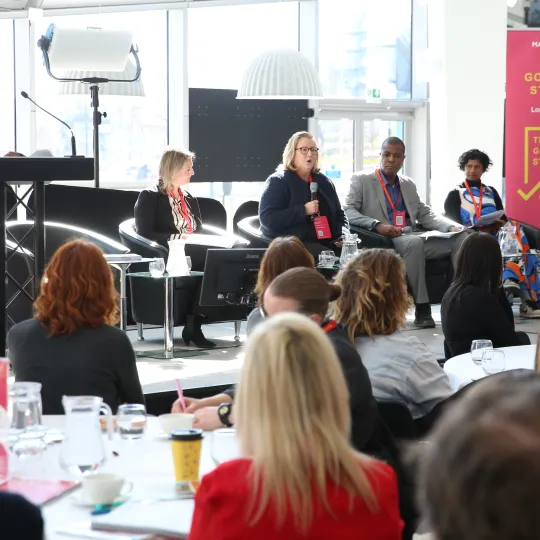
Fair pay and conditions
Good employers recognise the importance of fair pay, secure contracts and the financial wellbeing of their most valuable asset - their staff.
With fair pay and stable hours, employees thrive and so do businesses.
Providing fair pay and conditions can also include providing above minimum paid leave entitlements, consulting staff on their pay and benefits, implementing pay level transparency, and encouraging those in your supply chain to pay the London Living Wage.
The use of fair contracts, monitoring non-standard contracts, and investing in your staff's financial wellbeing, and encouraging others do do the same, can lead to improved reputation and retention.


To become a Good Work Standard employer, you must be accredited with the Living Wage Foundation, which is a voluntary, independently-determined hourly wage rate based on the cost of living.
Apply for the accreditationWhat best practice looks like
Getting started: statutory requirements and basic practices
To become accredited, employers must first complete an online foundation assessment which covers the minimum legal requirements and basic practices every employer should have in place.
Employers must meet the foundation criteria to move to the next stage.
All workers and employees are paid at least the relevant National Living Wage or National Minimum Wage (including apprentices).
Fair pay
- All workers and employees are paid at least the relevant National Living Wage or National Minimum Wage.
- All workers and employees are provided statutory leave entitlements (including holiday entitlement, sick pay, maternity, paternity and adoption leave).
- Itemised payslips are provided to all employees on a regular basis.
- Interns are paid the National Minimum Wage and receive the same employment rights as employees (apart from school work experience, work shadowing or voluntary placements).
- Statutory notice period, consultation and pay for employees is given if and when redundancies are made.
- Executive pay ratios are published in annual reports if the company is publicly listed.
Fair contracts
- A written statement of employment particulars is given on or before the first day of employment including information on pay and conditions.
- Employees and workers are given GDPR privacy information on how the organisation records, stores, and uses personal information.
- A Modern Slavery Act statement has been developed and published by the organisation (this is only required by organisations with annual turnover of £36 million or more).
- Any zero-hours contracts do not contain exclusivity clauses.
- Exploitative zero-hours contracts are not used. Non-standard contracts are only used where they benefit both worker and employer, and with the worker’s explicit consent.
Financial wellbeing
- New starters in the organisation are auto-enrolled in a pension scheme and mandatory minimum contributions are made as required by law.
- The workforce can access information and guidance on financial wellbeing, debt management, welfare rights and entitlements. For example, signposting to resources provided by the Money and Pension Service, Childcare Choices or other external financial advice organisations.


Next steps: benchmarking your organisation's practices
Once employers have successfully completed the foundation stage, they can complete the full self-assessment which assesses organisations against different criteria across the four pillars.
Microbusinesses can only be awarded at ‘achievement’ level - as it does not contain any ‘excellence’ criteria. Small, medium and large businesses can instead be awarded at 'achievement' or 'excellence' level.
Microbusiness must meet all criteria to accredit. Small, medium, and large businesses must meet a threshold but do not need to meet all criteria.
Microbusinesses
- The organisation is accredited as a Living Wage employer.
- Information and guidance on pensions and their benefits are provided and promoted to your workforce.
Small, medium and large businesses
Fair pay
- The organisation is accredited as a Living Wage employer.
- Apprentices are paid more than the apprentice minimum wage. They also receive pay increases to match their growing skills and experience as they progress through their apprenticeship.
- An above minimum paid leave entitlement is given to employees and workers. For example, this includes greater paid holiday, sick, bereavement, carers’, parental, maternity, paternity and adoption.
- Pay and benefits are set using feedback and consultation with workers and employees.
- The organisation fairly considers equal pay claims.
Fair contracts
- The organisation collects data and monitors the use of non-standard contracts, regularly reviewing how and when these are used. This includes zero-hours contracts, agency workers, fixed term contracts, sub-contractors and self-employed contractors or freelance workers.
- Any worker in the workforce can request a contract with guaranteed minimum hours and these are considered and responded to.
- Any worker in the workforce can request a contract with guaranteed minimum hours and these are considered and responded to.
- The organisation’s policies and procedures are communicated, shared and are accessible to all employees and workers in the workforce.
- Guidance and/or training is available on how to spot the signs of modern slavery and what workers can do.
- All workers are provided with a contract that reflects hours that are regularly worked (as judged against a 12-week reference period).
- Pay or compensation is provided when the organisation cancels a worker's shift with little or no notice.
- New and existing employees are informed of their right to join a trade union.
Financial wellbeing
- Information and guidance on pensions and their benefits are provided and promoted to the workforce.
- The organisation offers a mix of staff benefits in addition to regular pay.
- The organisation offers interest free loans to help workers with living costs. For example, childcare deposit loans, tenancy deposit loans and season ticket loans.
Fair pay
- All apprentices are paid the Living Wage as a minimum.
- Organisations in the supply chain are encouraged to pay and become accredited Living Wage employers.
- The organisation voluntarily calculates and publishes executive pay ratios for organisations with less than 250 employees.
- Pay levels and bands are accessible and transparent to help raise confidence that pay is set fairly across the organisation.
- The organisation applies a London Weighting to workers and employees based in London, to reflect higher pay rates and living costs of living in London.
- The organisation provides self-employed or freelancers with a written statement of engagement, including pay rates and escalation processes if any issues arise.
Fair contracts
- There is a policy or guidelines on reducing use of zero-hours contracts in the organisation or a positive policy or guidelines on promoting job security and secure contracts.
- The organisation reports on how non-standard contracts are used in annual reports, with a rationale for using them. Non-standard contracts include zero-hours, fixed-term, agency workers and self-employed contractors.
- Due diligence protocols are in place to ensure that organisations in the supply chain provide decent working standards to the people they employ.
Financial wellbeing
- Measures are taken to assist employees to build up a retirement pot based on the real cost of living, by meeting a minimum 12 per cent contribution (at least 7 per cent provided by the employer).
- The organisation works with local Credit Unions to provide affordable financial services to its workforce.
- The organisation offers a payroll saving scheme, allowing employees and workers to put aside savings as part of their regular payroll.
- Employees and workers are offered support with housing costs. Some examples could include loans, subsidies, or mortgage deals.
How to improve your practices

Explore guidance and resources
Explore our collection of resources, including employer guidance, toolkits and case studies all created to help you put good employment practices into action and achieve the Good Work Standard criteria in this pillar.

Below are some of the other London and UK-based programmes that help employers demonstrate their commitment to good work practices and employee wellbeing in the fair pay and conditions pillar.
Explore the other pillars
Contact us
If you have questions or would like to find out more about becoming a Good Work Standard employer, contact the Economic Fairness Team.
Need a document on this page in an accessible format?
If you use assistive technology (such as a screen reader) and need a version of a PDF or other document on this page in a more accessible format, please get in touch via our online form and tell us which format you need.
It will also help us if you tell us which assistive technology you use. We’ll consider your request and get back to you in 5 working days.